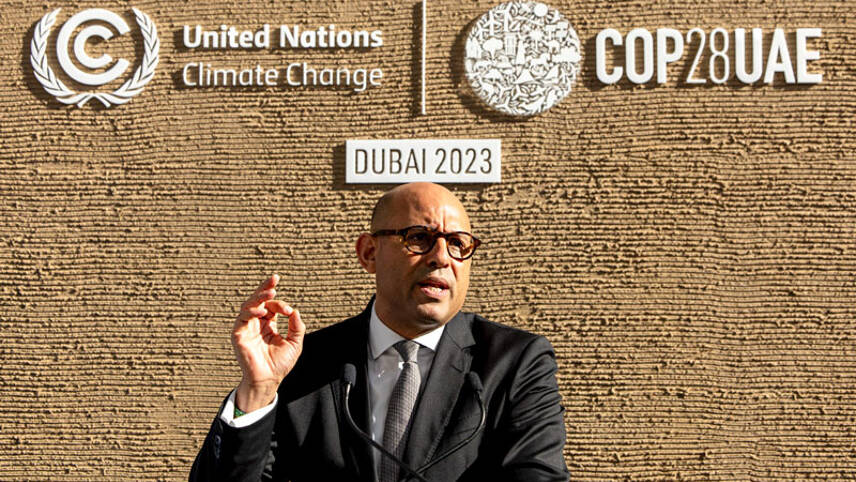Register for free and continue reading
Join our growing army of changemakers and get unlimited access to our premium content

Image: UNFCCC Flickr / Christopher Pike
Stiell gave what is expected to be his final press statement at COP28 in Dubai before the summit reaches an official conclusion on the morning of Monday (11 December).
The organising Presidency team is pushing for an “orderly” finish at 11am local time on Tuesday 12 December, but most COPs have run over time in the past, some by up to two days.
Stiell’s key message was that there is still everything to play for. He stated: “We are now here to discuss two issues. One – How high is our ambition on mitigation? And two – Are we willing to back this transition with the proper means of support to deliver it?
“Let me assure you – from our viewpoint at UN Climate Change – the highest levels of ambition are possible for both. I repeat – the highest levels of ambition are possible on both. But if we reduce on one, we reduce our ability to get either.
“The world is watching, as are 4,000 members of the global media, and thousands of observers here in Dubai. There is nowhere to hide.”
On adaptation, observers have grown increasingly concerned about slow negotiations and unambitious options remaining on the table this past weekend.
NGO CARE stated at the weekend that negotiators were “dropping the ball”, with talks “hurtling towards a damaging global failure”. It warned of “glacial” talks, largely lacking momentum towards an agreement on a proper global goal for adaptation and supporting delivery framework.
Additionally, it expressed concerns over failures to secure new financial commitments. The UN stated on the eve of COP28 that annual public finance flows for climate adaptation to the most vulnerable nations and regions must increase at least tenfold.
In terms of mitigation, the hottest topic of the whole COP has been whether fossil fuels should be phased out or down.
While the direction on coal was set at COP26 two years ago, petrostates including Saudi Arabia are continuing to block strong language on oil and gas. The High-Ambition Coalition of nations were backing a phase-out, with influential members including the EU-27.
Petrostates, meanwhile, are pushing hard for a phase-down and for special exemptions for oil and gas projects that are “abated” by energy efficiency improvements and carbon capture. This rhetoric is being spearheaded by the US and supported by the likes of Saudi Arabia, China and India.
A new draft Global Stocktake emerged at around 1.30pm UK time, or 4.30pm in Dubai. Changes made since the previous iteration removed potential options for a fossil fuel phase-out. Mentions of abatement have also been cut.
The text now states that nations should “reduce both consumption and production of fossil fuels, in a just, orderly and equitable manner so as to achieve net-zero by, before, or around 2050 in keeping with the science”.
Four asks of negotiators
Stiell issued four key calls to action to negotiators in the hopes of delivering a “meaningful deal”.
First up, he mentioned “clearing unnecessary tactical blockades” and avoiding “strategic landmines”. For example, at COP26 in Glasgow, the text on fossil fuels was weakened in the final minutes due to interjections from India and China.
Stiell then urged negotiators to “reject incrementalism”. He stated: “Each back from the highest ambition will cost countless millions of lives, not in the next political or economic cycle, for future leaders to deal with, but right now, across every country… Ultimately it is 8 billion people’s security that is at stake.”
Stiell’s third call was around continuing to include and respect every Party present in the talks, of which there are almost 200. Most are national governments.
Finally, he said: “It’s all eyes on the prize. That means highest ambition outcomes must stay front and centre.”
None of this will come easy. Negotiators have been at work round the clock for almost two weeks and UN Secretary-General Antonio Guterres warned today that “arbitrary red lines, entrenched positions and blocking tactics” are still on display in Dubai.
But the calls to action from Stiell and Guterres have been welcomed by NGOs as strong attempts to focus minds in these final hours of negotiations.
ActionAid International’s global climate justice lead Teresa Anderson said: “We’re now entering the crunch time of COP28, and everything depends on the outcomes of the Global Stocktake. Simon Stiell’s message is clear. The only way that COP28 can end our planet’s destructive addiction to fossil fuels is through rich countries delivering the finance to make this happen on the ground.
“Calling out ‘tactical blockages’, ‘landmines’ and ‘I win – you lose’ brinkmanship was a less-than-subtle rebuke to the powerful counties who are putting a narrow set of national interests above those of humanity. His plea echoes the fervent wish of everyone around the world – for COP28 to be a pivotal moment in history, that we can look back on in pride.”
View all of edie’s COP28 content here


Please login or Register to leave a comment.